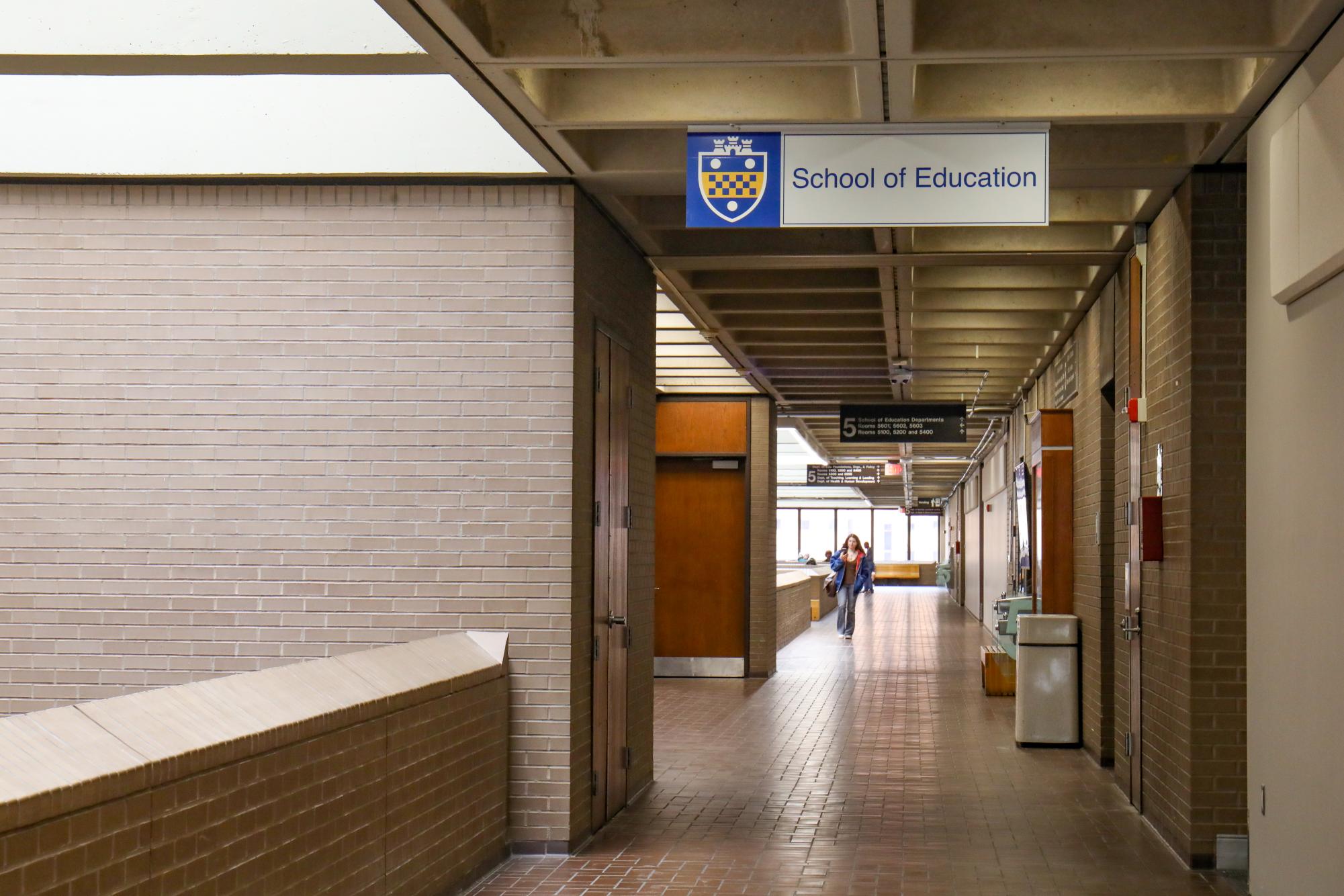Pitt faculty and students discuss potential effects of Trump’s executive order closing the Department of Education


The school of education in Posvar Hall.
On March 20, President Trump signed an executive order to close the federal Department of Education, which could affect student loans and education research at Pitt.
The Department of Education currently controls a $1.6 trillion federal student loan portfolio, administers the Free Application for Federal Student Aid and carries out congressional legislation, including Title I funding and the Individuals with Disabilities Education Act. Current department secretary Linda McMahon has said the cuts will give back control to parents over their children’s education and lower taxes.
The order mandates that the department shift its responsibilities to the states and terminate federal funding that supports DEI initiatives. To pass, the executive order requires congressional approval and would need 60 out of 100 votes to pass through the Senate. The current party division in the Senate is 53 Republicans and 47 Democrats.
Pitt declined to comment on the executive order.
Tomar Pierson-Brown, an assistant professor of law at Pitt who teaches education law, noted that the executive order’s language blames low-reading scores on the Department of Education, but that the claim is a misconception. She highlighted that curriculums are determined by state and local governments, whereas test scores are largely influenced by socioeconomic contexts.
Pierson-Brown instead suggested the government focus on community funding, such as paying people higher wages and ensuring adequate healthcare.
“If we want to see higher test scores, let’s think upstream,” Pierson-Brown said. “If you’re coming from a neighborhood with a lot of violence or where there’s housing instability, your capacity to learn at some benchmark indicator is going to be severely undercut.”
When signing the executive order, Trump said the department’s funding duties would be transferred to other agencies, such as the Small Business Administration and the Department of Health and Human Services. Prior to the executive order, the education department cut about half of its staff on March 11. Pierson-Brown said both of these moves will result in fewer people being available to administer its programs.
“Will that agency have the manpower to administer the programs so they remain accessible, so they’re not programs in name or idea only?” Pierson-Brown said. “So they’re things everyday families can rely on and use as generations have before them?”
Because of the lack of staffing, Pierson-Brown said she thinks there will be longer wait times for program approval, less direct assistance for families and fewer people to provide oversight to do research on education best practices — all of which she says the Department of Education has historically done.
“Someone is going to suffer from this lack of human resources,” Pierson-Brown said.
Rachael Stowe, an education graduate student at Pitt and the president of the Council of Graduate Students in Education, said she is not as concerned about how the political leanings of the individual states will affect education. Instead, she’s worried that state departments don’t have a federal level of capacity to administer its numerous programs on anti-discrimination.
“I think it’s hard to say whether it’s a left versus right situation when it comes to states,” Stowe said. “The issue is there aren’t going to be the people.”
Stowe used to work as a teacher in a Title I-funded elementary school and said federal funding is used not just for books and materials, but for hiring more teachers, care professionals and mental health counselors. However, Stowe worries that the state departments may not be prepared to administer federal-level funding in the time frame the administration has chosen.
“The state governments –- they’ve never done this type of work on this scale before, because the federal government, since the ’80s, has been in control of it,” Stowe said. “So they don’t have that knowledge and they don’t have the staffing to take on that major change.”
On February 11, Elon Musk’s Department of Government Efficiency cut nearly $900 million in funding to the Institute of Education Sciences. Stowe said that because of this, combined with the general funding cuts targeting DEI research, Pitt’s School of Education may be affected.
“Diversity, equity and inclusion are innately written into our mission and vision, and so there’s no guarantee that we wouldn’t eventually be directly impacted by it,” Stowe said.
Paulina Sanchez, a first-year education major and vice president of the Council for Exceptional Children at Pitt, added that the threat of cutting research funding is “dangerous” because it would minimize efforts to improve curriculums.
“If we’re not constantly researching and figuring out new ways we can fix these educational practices and implement new theories into our curriculum, there’s no way we can be progressive, as education should be,” Sanchez said.
In her education courses at Pitt, Sanchez has been learning about critical race theory and said she believes the executive order aims to delegitimize it by categorizing it as “leftist.”
“It’s dangerous to hide our past and hide the truth of our history, and I feel like that’s kind of the direction it’s gonna go,” Sanchez said.
Sanchez also thinks the Individuals with Disabilities Education Act is vulnerable to the shift to state control of education, adding that special education should be prioritized because it has not been in the past.
“If that’s taken away, then we can’t even ensure [students with disabilities] can receive the appropriate services they deserve,” Sanchez said.
To Sanchez, inclusive education is the epitome of a good society.
“I feel like the greatest place to start with helping others and becoming good citizens is through education. It’s the basis of everything anyone can ever do,” Sanchez said.
Recent Posts
Review | Tyler, the Creator and friends come to Pittsburgh on the ‘Chromakopia’ tour
With the release of his eighth studio album, “Chromakopia,” decorated rapper, songwriter and producer Tyler,…
A Good Hill to Die On // The motivation we all need
In this post of “A Good Hill to Die On,” staff writer Sierra O’Neil discusses…
Who Asked? // Is it really the damn phones?
This installment of Who Asked? by staff writer Brynn Murawski describes her brief journey limiting…
Students are ‘upset, but not surprised’ over denial of gender affirming care at UPMC CHP
Pitt students and LGBTQIA+ members express their concerns about the recent denial of gender affirming…
Take Madness Final Four | Battle of Pennsylvania, 412 and Just Outside of Philly clash
Welcome to the Final Four of Take Madness! We are down to four talented writers,…
Column | Best Sports Environments in Pittsburgh
Pittsburgh is undoubtedly one of the best sports cities in America. A deeply passionate fanbase…

